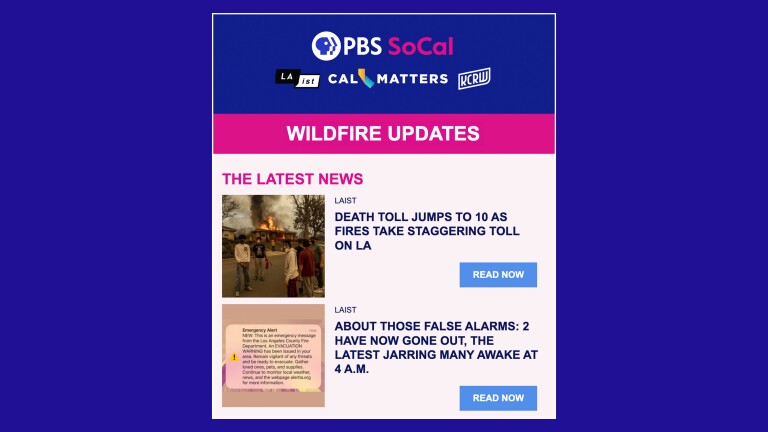Some Childcare Providers Lost Everything in the Eaton Fire. Why Can't They Get Any Relief Money?

This article was originally published March 6, 2025 on laist.com.
Do you remember the last time you were on endless hold with customer service? Or in line at the DMV with no end in sight?
Take those experiences and multiply them together and it might begin to explain what life's been like for Felisa Wright since January. She lost her Altadena home, where she also ran a childcare business, in the Eaton Fire. That was just the beginning.
A few dozen other local childcare providers are in a similar situation. The state offered financial assistance for a month, but that money has since run out.
As wildfires impact our communities, your trusted public media organizations have come together to deliver free, reliable, and essential news and updates.

Wright said what's followed is an endless bureaucratic maze as she seeks the help she needs to recover. That path is laid with blockades and countless visits to the disaster center in Pasadena and the post office. And still, two months later, Wright and her family don't have a permanent place to live. She said she hasn't been able to access a small business loan, or FEMA money beyond an initial emergency $770. Even her disaster unemployment hasn't started yet.
" I'm applying for everything, but what's not working is it's not immediate," Wright said. "I need something now. Right now."
'They're not making it easy'
Wright and other childcare providers told LAist that their recovery efforts are layered with Catch-22s. Wright said she was rejected when applying for a small business loan because she didn't make enough money. But to start making money again, she'll need to reopen her childcare center.
She hasn't been able to rent a new place in part because she doesn't have proof of income or any savings. But she can't get new income until she rents a new place and resumes her business there. She said she has yet to receive disaster unemployment payments, too.
" It's just too much footwork and, and I already have enough stress on me right now," Wright said. "They're not making it easy. It's not easy."
Someone launched a GoFundMe for Wright, but she wants to save that money for long-term recovery. So for day-to-day expenses, the saving grace has been her renter's insurance, which she said has helped cover hotels and basic needs for her, her kids and her grandkids after the fires. It also paid her for some of what she lost. This has been a lifeline, but she said it's also the reason she hasn't been able to access significant FEMA funds, although FEMA has given her some free nights at short-term rentals and hotels.

What has California offered childcare providers?
Gov. Gavin Newsom extended payments to affected childcare providers for 30 days after the fires but declined to extend those payments further. Instead, he has directed state agencies to help providers who still can't operate look into their eligibility for Disaster Unemployment Assistance.
The union representing childcare providers said providers in Altadena were paid an average of $3,854 monthly by the state as of October. They want those payments to continue.
"I'm baffled," said Child Care Providers United chair Max Arias of the governor's decision to not keep paying. "And I don't know why, because it's not even expensive."
The California Department of Social Services said that 33 licensed family childcare homes are still non-operational after the fires. The union put that number at 54, and estimates those providers served 280 families.
Childcare provider Alana Lewis, like Wright, said she has been denied a small business loan, and that state payments would help her get other aid.
" Continuing to pay me is the difference that it would make for me when I go to apply for an apartment. It will show that I have income coming in," Lewis said. "When I go to apply for a small business loan, it will show that I have income coming in. It will help me to continue to run my business."
A spokesperson from Newsom's office said that the governor's executive action directing childcare providers toward unemployment assistance "speaks for itself."
Struggle to get disaster aid is a national problem
Studies show that after disasters, federal aid disproportionately benefits wealthier people and white communities. One reason for this is the time and resources needed to apply for aid.
FEMA tells disaster victims not to give up if they receive a letter saying they're ineligible, and to look at the letter closely and follow up. Alessandra Jerolleman, who researches disaster relief at Loyola University New Orleans, said that's not easy for people navigating a crisis.
"When somebody is trying to make ends meet, right, when every minute is necessary for survival, is it reasonable to ask them to spend days trying to navigate this process to maybe get assistance?" she said.

Advocates say one solution to this problem would be streamlining federal aid applications through one main hub rather than having people applying for so many disparate forms of support.
A bill to do just that, the Disaster Assistance Simplification Act, passed the U.S. Senate in 2023 but didn't get through the House.
"The system is not working in the way that it was intended to and needs dramatic reform," said Noah Patton with the National Low Income Housing Coalition, a group pushing for this change.
Felisa Wright is still in a daily struggle to recover. She said money from her renter's insurance for temporary housing has run out, so now she's hoping she can get more from FEMA to keep going.
"I'm not a quitter. I don't give up easily," she said. "I'm gonna keep on pressing towards the mark."

